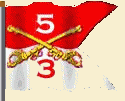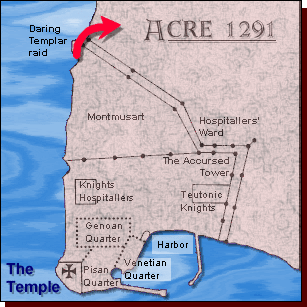


Notice: This is the official website of the All Empires History Community (Reg. 10 Feb 2002)
|
Post Reply 
|
| Author | |
Abudhar 
Knight 
Joined: 02-May-2012 Location: Algiers Online Status: Offline Posts: 77 |
 Topic: This day in History-the fall of Acre-the 31st of Topic: This day in History-the fall of Acre-the 31st ofPosted: 30-Jul-2012 at 08:09 |
|
*THIS DAY IN HISTORY *The Conquest of Acre *The 31st of July 1291 *Acre(Occupied Palestine) *Elapsed Time: 721 Years. *The Siege of Acre also called Akka in Arabic took place on the 31st of July 1291 and resulted in the loss of the Crusader-controlled city of Acre to the Muslims. It is considered one of the most important battles of the time period. Although the crusading movement continued for several more centuries, the capture of the city marked the end of further crusades to the Levant. When Acre fell, the Crusaders lost their last major stronghold of the Crusader Kingdom of Jerusalem ,they still maintained a fortress at the northern city of Tartus, engaged in some coastal raids, and attempted an incursion from the tiny island of Ruad, but when they lost that as well in 1302/1303 in the Siege of Ruad, the Crusaders no longer controlled any of the Holy Land.
Following the fall of Tripoli, king Henry of Cyprus sent the senechal Jean de Grailly to Europe to warn European monarchs about the critical situation in the Levant.[3] Jean met with Pope Nicholas IV who shared his worries and wrote a letter to European potentates to do something about the Holy Land. Most however were too preoccupied by the Sicilian question to organize a Crusade, as was king Edward I too entangled in troubles at home.Although a ten-year truce had been signed in 1289, Qalawun deemed the truce void following the killings. By October, Qalawun had ordered a general mobilization. Though the Sultan died in November, he was succeeded by his son Khalil who would lead the forces attacking Acre. Qalawun, father of Khalil, conquered the County of Tripoli in 1289, and in 1290 marched on Acre, the capital of the remnant of the Kingdom of Jerusalem, but, to the relief of the Franks of Acre, he died in November before launching the attack. He was succeeded by Khalil who decided to continue the attack. Khalil sent a message to William of Beaujeu, the Master of the Temple, telling him about his intentions to attack Acre and urging him not to send messengers or gifts, but a delegation from Acre led by Sir Philip Mainebeuf,] arrived in Cairo with gifts and appealed to Khalil not to attack Acre. Khalil did not accept the request and imprisonedrce?] the Frank messengers. Al-Ashraf Khalil assembled the forces of Egypt and Syria, which included a great number of volunteers and siege engines from everywhere at Hisn al-Akrad,some of Khalil's catapults were huge and had such names as "Al Mansuri" and "The Furious" in addition to lighter, but potent, mangonels called "Black Bulls" as well as four armies from Damascus (led by Lajin), Hama (led by al-Muzaffar Taqai ad-Din), Tripoli (led by Bilban) and Al Kark (led by Baibars al-Dewadar) marched to Acre to join the Egyptian army of Khalil.In addition to the historian Baibars al-Dewadar who led the army of Al Karak, Abu al-Fida was another prominent historian who accompanied al-Ashraf in his Levantiane expedition, However the Franks of Acre were for some time aware of the seriousness of the situation. They asked for help from Europe which resulted in nothing significant. A small group of knights, among them the Swiss Otto of Grandson, were sent by king Edward I of England. Burchard of Schwanden, the Grand Master of the German Teutonic Knights, resigned and was replaced by Konrad von Feuchtwangen who suddenly left Acre for Europe. The only noteworthy reinforcement came from king Henry II of Cyprus who fortified the walls and sent forces led by his brother Amalric to defend the city. The Franks sent messengers to Al-Ashraf Khalil who saluted him on their knees. Khalil asked them whether they brought him the keys of the city, but they replied that the city could not be surrendered so easily and that they only came to plea for mercy for the poor inhabitants and that the Franks were willing to discuss any injustice done by them earlier to the Muslims and to restore the truce signed by them and the Muslims. Khalil promised the messengers to spare the life of everyone if the Franks hand him Acre peacefully, but the messengers refused his offer, while the messengers were still there a huge catapult stone launched from the city struck the ground near the sultan's tent. Khalil, believing that the crusaders were negotiating in bad faith, reacted furiously and wanted to kill the two messengers, but Emir Sanjar al-Shuja' pleaded for them and they were sent back to the city. By morning the attack had resumed; noticing the lack of Cypriot defence at the tower and gate of St. Anthony, Khalil ordered his Chages to fill up a ditch to allow the cavalry access. The Chages, sectaries to the Mameluks and known for self-immolation in the name of Islam, followed the order with their living bodies forming a bridge over which the cavalry advanced and gained the foot of the walls. The Muslim forces advanced towards the Accursed Tower and forced the Frankish garrison to retreat to the side of the Gate of St. Anthony. All counter-attacks and attempts made by the Hospitallers and the Templars to recapture the tower were in vain. King Henry II and the Master of the Hospital boarded their galleys and fled from Acre. William of Beaujeu, the Master of the Temple, and Matthew of Clermont were killed. By capturing these positions, the Muslim forces were now inside the city fighting the Franks in the streets and alleys of Acre, which turned into a terrifying chaos as the inhabitants were fleeing towards the sea. How many inhabitants perished on land and in sea is unknown. The fall of Acre signaled the end of the Jerusalem crusades. No effective crusade was raised to recapture the Holy Land afterwards, though talk of further crusades was common enough. By 1291, other ideals had captured the interest and enthusiasm of the monarchs and nobility of Europe and even strenuous papal efforts to raise expeditions to retake the Holy Land met with little response. The Latin Kingdom continued to exist, theoretically, on the island of Cyprus. There the Latin kings schemed and planned to recapture the mainland, but in vain. Money, men, and the will to do the task were all lacking. One last effort was made by King Peter I in 1365, when he successfully landed in Egypt and sacked Alexandria. Once the city was pillaged, however, the Crusaders returned as speedily as possible to Cyprus to divide their loot. As a crusade, the episode was futile, leading instead to a destructive counter-raid by the Mamelukes; Cyprus was later forced into Mameluke vassalship with a hefty yearly tribute. The 14th century saw some other crusades organized, but these enterprises differed in many ways from the 11th- and 12th-century expeditions which are properly called Crusades. The crusades of the 14th century aimed not at the recapture of Jerusalem and the Christian shrines of the Holy Land, but rather at checking the advance of the Ottoman Turks into Europe. While many of the crusaders in these 14th-century undertakings looked upon the defeat of the Ottomans as a preliminary to the ultimate recapture of the Holy Land, none of the later crusades attempted any direct attack upon Palestine or Syria. |
|
|
Seek Knowledge from the Cradle to the Grave-Prophet Mohamed(P.B.U.H)
|
|
 |
|
Centrix Vigilis 
Emperor 

Joined: 18-Aug-2006 Location: The Llano Online Status: Offline Posts: 7392 |
 Posted: 30-Jul-2012 at 14:30 Posted: 30-Jul-2012 at 14:30 |
|
This a cut and paste from wiki...which you give no credit for as a source... as lame as they are. You have been warned previously by the Owner reference this. Consequently you are in violation of failing to follow guidance by staff and trolling. Both Coc violations. Go to the bench. You are suspended.Thread locked.
CV Edited by Centrix Vigilis - 30-Jul-2012 at 14:32 |
|
|
"Absence of evidence is not evidence of absence"
S. T. Friedman Pilger's law: 'If it's been officially denied, then it's probably true' |
|
 |
|
Post Reply 
|
| Forum Jump | Forum Permissions  You cannot post new topics in this forum You cannot reply to topics in this forum You cannot delete your posts in this forum You cannot edit your posts in this forum You cannot create polls in this forum You cannot vote in polls in this forum |
Bulletin Board Software by Web Wiz Forums® version 9.56a [Free Express Edition]
Copyright ©2001-2009 Web Wiz
This page was generated in 0.056 seconds.
Copyright ©2001-2009 Web Wiz
This page was generated in 0.056 seconds.











 This day in History-the fall of Acre-the 31st of
This day in History-the fall of Acre-the 31st of Printable Version
Printable Version Google
Google Delicious
Delicious Digg
Digg StumbleUpon
StumbleUpon Windows Live
Windows Live Yahoo Bookmarks
Yahoo Bookmarks reddit
reddit Facebook
Facebook MySpace
MySpace Newsvine
Newsvine Furl
Furl Topic Options
Topic Options



